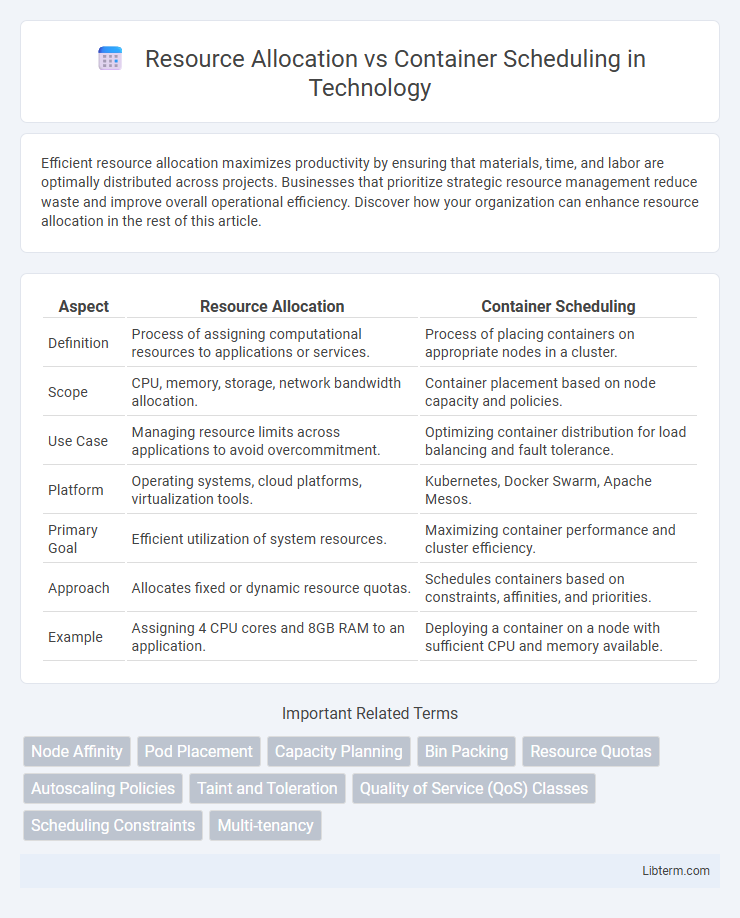Efficient resource allocation maximizes productivity by ensuring that materials, time, and labor are optimally distributed across projects. Businesses that prioritize strategic resource management reduce waste and improve overall operational efficiency. Discover how your organization can enhance resource allocation in the rest of this article.
Table of Comparison
| Aspect | Resource Allocation | Container Scheduling |
|---|---|---|
| Definition | Process of assigning computational resources to applications or services. | Process of placing containers on appropriate nodes in a cluster. |
| Scope | CPU, memory, storage, network bandwidth allocation. | Container placement based on node capacity and policies. |
| Use Case | Managing resource limits across applications to avoid overcommitment. | Optimizing container distribution for load balancing and fault tolerance. |
| Platform | Operating systems, cloud platforms, virtualization tools. | Kubernetes, Docker Swarm, Apache Mesos. |
| Primary Goal | Efficient utilization of system resources. | Maximizing container performance and cluster efficiency. |
| Approach | Allocates fixed or dynamic resource quotas. | Schedules containers based on constraints, affinities, and priorities. |
| Example | Assigning 4 CPU cores and 8GB RAM to an application. | Deploying a container on a node with sufficient CPU and memory available. |
Introduction to Resource Allocation and Container Scheduling
Resource allocation involves distributing available system resources such as CPU, memory, and storage to various applications or services to ensure optimal performance and utilization. Container scheduling specifically refers to the process of assigning containers, which encapsulate applications and their dependencies, to appropriate hosts or nodes within a cluster based on resource availability and predefined policies. Efficient resource allocation and container scheduling are crucial for maintaining system stability, maximizing throughput, and reducing latency in containerized environments.
Understanding Resource Allocation in Cloud Environments
Resource allocation in cloud environments involves distributing available computing resources like CPU, memory, and storage to various applications and services based on demand and priority. Effective resource allocation ensures optimal utilization, minimizes waste, and maintains performance by dynamically adjusting resources according to workload changes. Understanding the distinction from container scheduling, which focuses on assigning specific containers to nodes, highlights resource allocation's broader role in managing the overall capacity of cloud infrastructure.
The Role of Container Scheduling in Modern IT
Container scheduling plays a critical role in modern IT by efficiently managing the deployment and operation of containerized applications across a cluster of resources. Unlike general resource allocation, container scheduling optimizes workload distribution based on real-time factors such as resource availability, workload demands, and application priorities, ensuring high availability and scalability. Advanced schedulers like Kubernetes enhance infrastructure utilization and application performance by automating container placement and lifecycle management within dynamic cloud environments.
Key Differences Between Resource Allocation and Container Scheduling
Resource allocation involves distributing available system resources such as CPU, memory, and storage to various applications or services based on their demands and priorities. Container scheduling focuses on placing and managing containers on nodes in a cluster, optimizing workload distribution and ensuring efficient resource utilization. The key difference lies in resource allocation being a broader strategy of assigning resources, while container scheduling is a specific operational process to deploy and run containers efficiently within the allocated resources.
Benefits of Effective Resource Allocation
Effective resource allocation improves workload efficiency by matching computing power, memory, and storage to container needs, reducing resource contention and maximizing utilization. It enhances application performance through optimized distribution of CPU and network bandwidth, leading to faster response times and higher throughput. Proper allocation also minimizes operational costs by preventing over-provisioning and enabling scalable container orchestration in multi-tenant environments.
Advantages of Efficient Container Scheduling
Efficient container scheduling optimizes resource allocation by dynamically assigning workloads to the most suitable nodes, maximizing hardware utilization and minimizing operational costs. It reduces latency and improves application performance by ensuring containers run on nodes with optimal resource availability and network proximity. This approach enhances scalability and resilience, enabling faster deployment and better handling of fluctuating demands in cloud-native environments.
Challenges in Resource Allocation and Container Scheduling
Challenges in resource allocation include accurately predicting workload demands and effectively distributing computational resources to prevent underutilization or bottlenecks. Container scheduling faces difficulties in balancing container placement based on resource availability, minimizing latency, and managing dynamic scaling in multi-tenant environments. Both require sophisticated algorithms to optimize performance while ensuring fairness and fault tolerance in heterogeneous cloud infrastructures.
Popular Tools for Resource Allocation and Container Scheduling
Kubectl and Mesos are prominent tools for resource allocation, enabling efficient distribution of computing resources across clusters. Kubernetes excels in container scheduling by dynamically assigning containers to nodes based on resource availability and workload demands. Apache YARN complements resource management by allocating resources across diverse distributed applications, while Docker Swarm provides streamlined container orchestration for seamless scheduling.
Best Practices for Optimizing Both Processes
Efficient resource allocation and container scheduling are critical for maximizing performance and minimizing costs in Kubernetes environments. Utilize resource requests and limits to prevent overcommitment, while leveraging node affinity and taints to ensure containers are scheduled on appropriate nodes, improving workload isolation and reliability. Employ autoscaling mechanisms and monitor cluster resource utilization continuously to dynamically adjust allocations and scheduling policies for optimal resource use and responsiveness.
Future Trends in Resource Allocation and Container Scheduling
Future trends in resource allocation and container scheduling emphasize the integration of AI-driven automation to enhance efficiency and adaptability in dynamic cloud environments. Edge computing and serverless architectures demand more granular resource management, pushing advancements in real-time scheduling algorithms and predictive analytics. Container orchestration platforms like Kubernetes are evolving to support hybrid and multi-cloud deployments, optimizing workload distribution and minimizing latency through intelligent resource allocation strategies.
Resource Allocation Infographic

 libterm.com
libterm.com